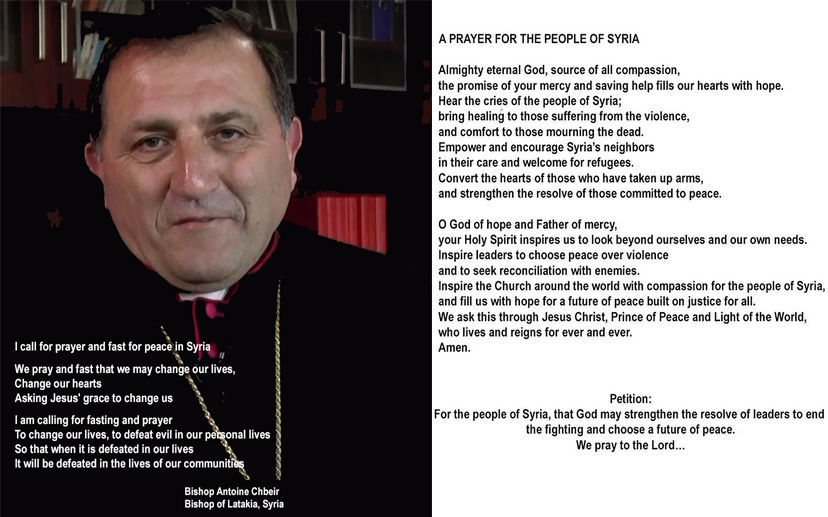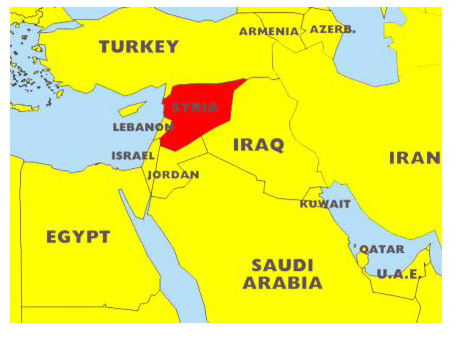Prayers of the Faithful for each Sunday of the Year. The Solidarity in Faith Committee has composed prayers of the faithful to be prayed at Mass for each Sunday of the year. Pastors are encouraged to use these prayers or compose their own.
Prayer Cards to pray for Bishop Chbeir and the Diocese of Latakia


Maronite Church and Christianity in Syria
(from Bishop Chbeir’s letter to Fr. Murray)
The Maronite Church is linked to 4th century saint St. Maroun. St. Maroun was a priest who became a hermit, retiring to the mountain of Taurus near Antioch. His holiness and miracles attracted many followers and garnered attention from throughout the empire. St. John Chrysostom sent a letter to St. Maroun around 405 AD expressing his great love and respect and asking Sr. Maroun to pray for him.
St. Maroun is considered the Father of the spiritual and monastic movement of the Maronite Church. This movement has a profound influence on Northern Syria and Lebanon. St. Maroun spent all of his life on a mountain in the region of Cyrrhus in Syria. It is believe that the place was called Kefar-Nabo on the mountain of Ol-Yambos, making it the cradle of the Maronite movement.
St. Maroun’s way was deeply monastic with emphasis on the spiritual and ascetic aspects of living. He embraced the quiet solitude of the mountain life. He lived his life in open air exposed to the forces of nature such as sun, rain, hail, and snow. His extraordinary desire to come to know God’s presence in all things allowed Sr. Maroun to transcend such forces and discover that intimate union with God. He was able to free himself from the physical world by his passion and fervor for prayer and enter in to a mystical relationship of love with God.
St. Maroun was a mystic who started this new ascetic-spiritual method that attracted many people in Syria and Lebanon to become his disciples. Accompanying his deeply spiritual and ascetic life, he was a zealous missionary with a passion to spread the message of Christ by preaching it to all he met. He sought not only to cure the physical ailments that people suffered but has a great quest for nurturing and healing the “lost souls” of both pagans and Christians of his time.
This missionary work came to fruition when in the mountains of Syria, Sr. Maroun was able to convert a pagan temple into a Christian Church. This was to be the beginning of the conversion of Paganism to Christianity in Syria which would then influence and spread to Lebanon. After his death in the year 410AS, his spirit and teaching lived on through his disciples.
Many Different Christian Rites
There is a richness and a diversity represented in the Christian mosaic in Syria. In addition to the Greek Orthodox majority who make up half of the Christian Syrians, there are also Maronites (Catholic), Syriac Catholics, Greek Catholics, Armenian Apostolic, Armenian Catholics, and Chaldeans. There are Latins, Jacobites, Protestants and Nestorians.
It is estimated that 6.5% of the 23 million Syrians are Christian – so about a million-and-a-half souls. There is dwindling population of Syrian Christians, partly due to a declining fertility rate among Christians and also because of Christian emigration.
Violence and persecutions
With tens of thousands of deaths, wounded, disables and countless numbers of internally displaced persons, refugees, widows and orphans, the last six years have resulted in a theater of conflict of unprecedented violence in Syria and the surrounding region.
In this crucible of Christianity, where St. Paul was converted in the 1st century, Christians have paid a very high price for their closeness to the Alouites who have governed the country and protected the minorities.
Christians today share the dramatic fate of their fellow citizen, exacerbated by the anxiety of their future, in the country of the most ancient churches. Like all Syrians, Christians are exposed to fighting, atrocities and the economic difficulties of a devastating conflict, but are also confronted with additional existential dilemmas.
Christians have limited choices. The Syrian Christians are the only community without a defined territory. They are scattered throughout the country without any political or military boundaries.
Throughout history, there has been evidence of harmony between Syrian Christians and Muslims characterized by the common celebration of their respective religious holidays, the bonds of mutual friendship on the benches of the school and university and their frequent collaboration in business and on national projects. In contrast to the bloody violence that has characterized Egypt and Lebanon, there has never been a history of tension between the Christians and Muslims in Syria.
On the road to Aleppo, in the North of the country, there is the basilica of St. Simeon and the column of the fifth century hermit who, according to the account of one of the hagiographers “resisted the heat of thirty summers and the cold of as much as thirty winters” through constant prayer.
The beginning of the so-called Arab spring was accompanied by the rise of extremist groups affiliated with al-Qaida, composed mainly of non-Syrians, who sought to impose a radical vision of Islam in areas out of the control of the government through an imposition of terror. This was seen in the rise of public beheadings, torture, kidnapping…
Exodus
Since the beginning of the conflict, it is estimated that half of the Christians have had to leave their homes to seek refuge abroad, or in other regions within the country, particularly in the diocese of Latakia which includes four departments: Latakia, Tartus, Homs and Hama.
According to international organizations, more that 60% of Syrians are displaced. This is a humanitarian disaster of unprecedented magnitude, which the world has not fully grasped.
Among Christians, despair and anticipatory fear of the persecution and abuses have resulted in a preventative exodus, most notably in areas placed under control of extremist armed groups. This phenomenon of emigration, which has been a trend over the past twenty years, has accelerated dramatically with the recent conflicts.
Unlike other political and cultural communities, such as the Sunnis who are massively rallied to the insurgency, the Alawites, who are intimately invested in the politics of the State, the Druze mountain dwellers who a have a strong warrior tradition and Kurds who have a history of an autonomous militia, the Christians have no own military force on the ground. Scattered throughout all of Syria, the Christians are not protected by boundaries, as with other minorities, nor do they have any recognized community federation. Their survival on the land of their ancestors now depends on the outcome of the devastating conflict that continues to destroy everything.
Uprooted, unarmed, and without a delineated territory appropriated to them, the Christians of Syria will owe their survival to the resolution of a conflict whose violence and barbarism affect the whole international community today.
Daily Reality
Currently, the daily reality of the Syrian people is characterized by the calamities of an economic slump devastating the population, the constant devaluation of the currency, increasing destruction and emigration, and ongoing atrocities and acts of violence committed by armed Islamist groups.
Less than 4% of the population of the Middle East is Christian. Rather than be discouraged by this number, we should be encouraged by the affirmation of his Holiness Benedict XVI when he spoke about Europe: What counts is the quality and not the quantity. Christians of the Middle East have been the leaven, witnessing to a future hope and promise: not because of their own strength or their skill, but by the active, redemptive and transforming presence of their Savior Jesus Christ among them.
Without wanting to idealize the suffering of the ordeal or the persecution, it is precisely in such circumstances that the Church prospers, and that the faithful become more attached to their Savior and find in their faith the answer to all their woes.
Who can better proclaim the Gospel to the Arab world and thus reduce terrorism if not Arab speakers? What harm is there to announce the universal message grounded in Christian morality such as “love your neighbor as yourself” or moreover, “what you want others to do for you, do it for them.”
Formation of Clergy
There are 32 clergy in the diocese of Latakia. None can speak a foreign language. Bishop Chbeir has been in charge of the Diocese of Latakia for two and a half years. Right from the beginning he decided to teach seminarians in French. In Lebanon, theology is taught in French and Arabic. The two-year pre-seminary period aims as accustoming seminarians to follow a very dense spiritual life and to learn French and to discern their vocation.
Teaching seminarians in French is vital for them and for the diocese. It enables them to follow their philosophical and theological studies in French, to widen their research and horizons so that they may become more mature. Furthermore, they could run our schools we are hoping to construct.
Bishop Chbeir teaches three biblical formation in three sectors of the diocese. He himself studied in Rome 25 years ago. It is the most basic way to be in touch with the faithful.